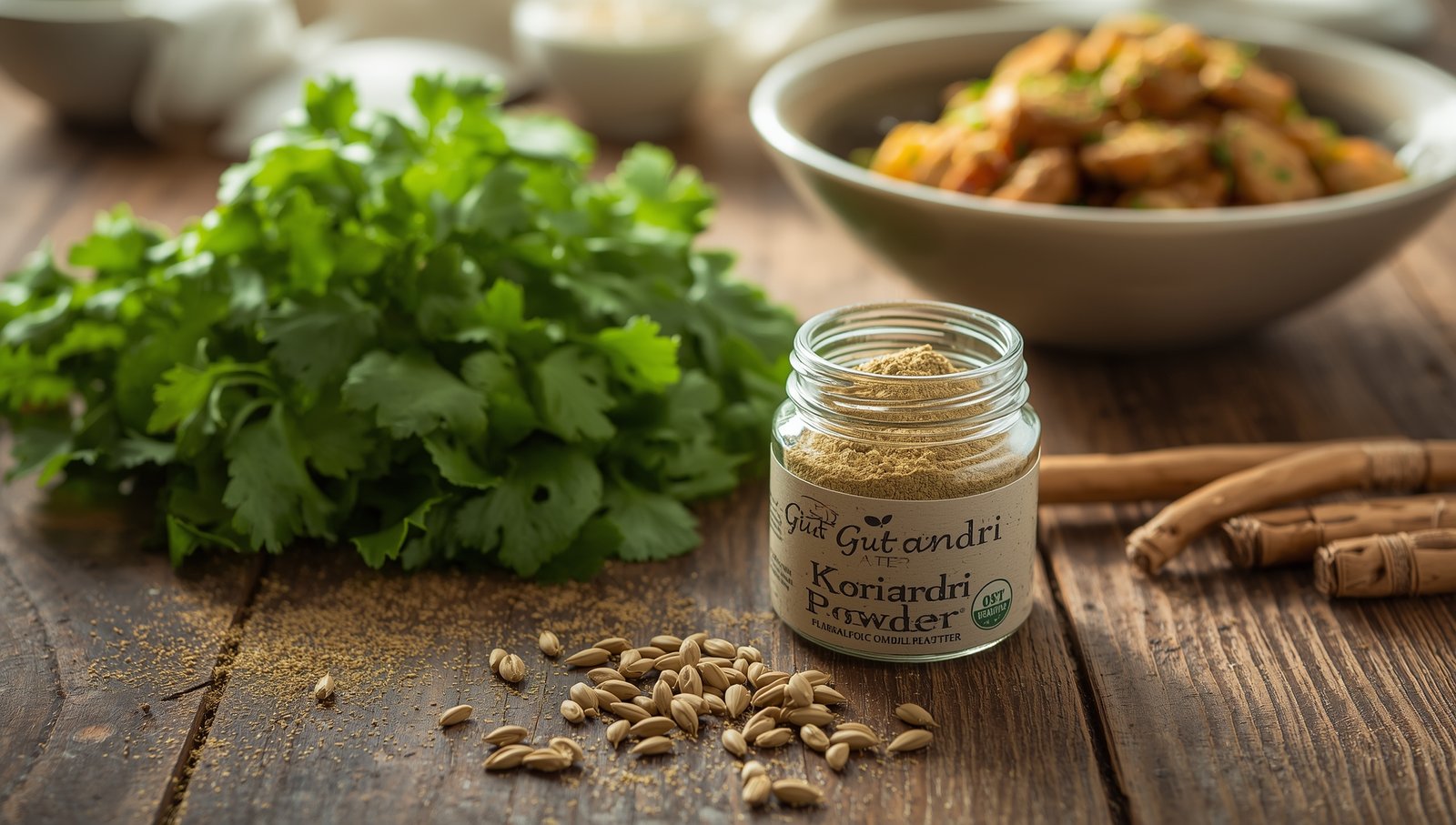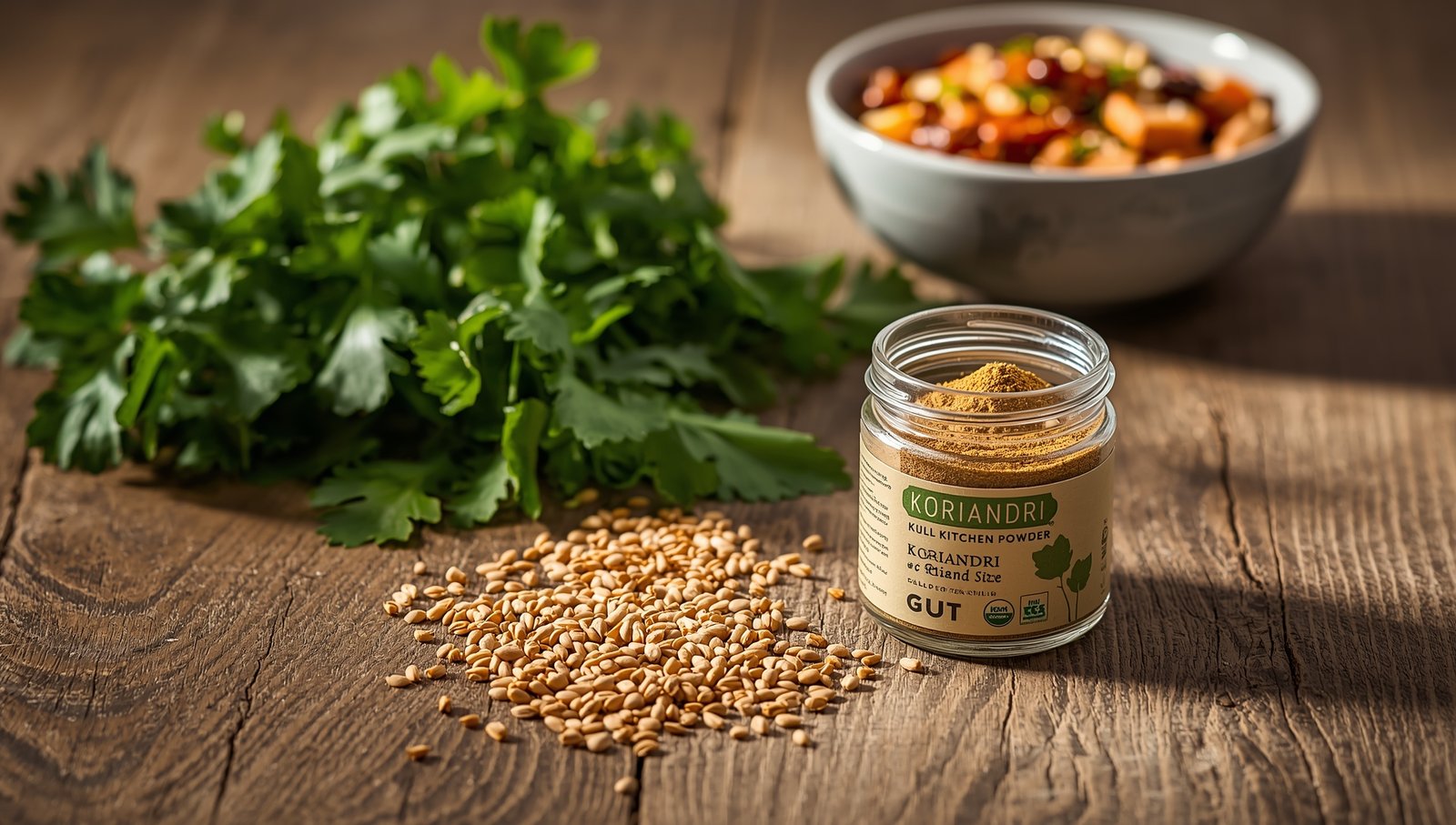The Ultimate Guide to Koriandri: From Kitchen Spice to Natural Health Booster
Introduction
Koriandri, more commonly known as coriander or cilantro, is a spice and herb that has been treasured across cultures for thousands of years. From its bright, citrusy leaves to its warm, aromatic seeds, koriander has made its mark in kitchens, medicine cabinets, and wellness routines around the world. But what exactly is koriandri? Why is it gaining so much attention among fitness enthusiasts and health-conscious consumers? And how can you incorporate it into your daily life to reap its benefits?
In this comprehensive guide, we’ll dive deep into everything you need to know about koriander its culinary uses, impressive health benefits, traditional and modern applications, and even how products like Gut Bio Organic 65g koriandri powder can make it easy to enjoy this powerhouse spice every day.
What is Koriandri?
Koriandri, also known as coriander in many parts of the world, refers to both the fresh leaves and dried seeds of the Coriandrum sativum plant. The term is commonly used in South Asian countries, where it plays an essential role in daily cooking and traditional remedies.
-
Fresh Koriandri (Cilantro): Bright green, tender leaves with a distinctive citrusy flavor often used as a garnish or ingredient in salads, curries, and salsas.
-
Koriandri Seeds (Coriander Seeds): Small, round seeds that have a warm, slightly nutty flavor when toasted or ground, used as a spice in cooking and baking.
Koriandri powder is simply ground coriander seeds, offering a concentrated form of the spice that’s easy to store and use.
Culinary Uses of Koriandri
The unique flavor profile makes it incredibly versatile in the kitchen. It enhances both savory and sweet dishes and pairs well with a wide variety of ingredients.
Popular Uses
-
Seasoning for Curries and Stews: Ground koriander adds depth and warmth to Indian, Middle Eastern, and Mexican dishes.
-
Fresh Herb in Salads and Salsas: The fresh leaves provide a refreshing contrast to spicy and tangy flavors.
-
Marinades and Rubs: Koriandri powder blends well with other spices like cumin, turmeric, and chili to create flavorful marinades for meats and vegetables.
-
Baking: Coriander seeds can be used in baking bread and cookies, adding a subtle sweetness and complexity.
-
Beverages: In some cultures, coriander seeds are boiled to make digestive teas or refreshing drinks.
How to Use Gut Bio Organic 65g Koriandri Powder

The Gut Bio Organic 65g koriandri powder offers an easy way to incorporate this spice into your cooking without the hassle of grinding seeds yourself. Use it to:
-
Sprinkle over roasted vegetables or grilled meats
-
Add to soups or stews for extra flavor
-
Mix into homemade spice blends or sauces
-
Boost the aroma in rice dishes or flatbreads
Health Benefits of Koriandri
Fitness enthusiasts and health-conscious consumers are increasingly turning to natural ingredients that provide functional benefits, and koriandri fits this demand perfectly. Let’s explore some of its scientifically-backed health benefits:
1. Rich in Antioxidants
Koriandri contains powerful antioxidants like quercetin and tocopherols that help neutralize free radicals—unstable molecules that can damage cells and accelerate aging. This antioxidant activity supports overall health and protects against chronic diseases.
2. Anti-Inflammatory Properties
Chronic inflammation is linked to conditions like arthritis, heart disease, and metabolic syndrome. Compounds in koriandri have been shown to reduce inflammatory markers, potentially helping to alleviate symptoms and promote better joint and cardiovascular health.
3. Supports Digestion
Traditionally, koriandri has been used to soothe digestive issues. It stimulates the production of digestive enzymes and bile, easing indigestion, bloating, and gas. It also has mild antimicrobial properties that may help maintain a healthy gut flora.
4. Blood Sugar Regulation
Several studies indicate that koriandri can help lower blood sugar levels by enhancing insulin secretion and activity. This makes it a valuable spice for managing diabetes or preventing blood sugar spikes after meals.
5. Heart Health
Koriandri’s antioxidant and anti-inflammatory effects contribute to improved heart health. Additionally, it may help reduce bad LDL cholesterol and increase good HDL cholesterol, supporting balanced lipid levels.
6. Detoxification
Coriander has been studied for its ability to bind heavy metals and toxins in the body, aiding in detoxification processes—especially valuable for those exposed to environmental pollutants.
7. Antimicrobial Effects
Koriandri contains natural compounds that exhibit antibacterial and antifungal properties, which can help protect against infections.
Traditional and Global Importance of Koriandri
Koriandri’s history spans millennia and continents:
-
Ancient Egypt: Used in embalming and as a flavoring agent.
-
Ayurveda: Valued for its cooling and digestive properties, often prescribed for inflammation and skin disorders.
-
Traditional Chinese Medicine: Used to aid digestion and improve appetite.
-
Middle Eastern and Mediterranean Cuisines: A staple spice in many iconic dishes.
-
Latin America: Fresh coriander leaves are essential in salsas and ceviches.
Its widespread use in traditional medicine and cooking highlights its importance as a plant that bridges cultural and culinary divides.
How to Incorporate Koriandri Into Your Daily Routine
For fitness enthusiasts and health-conscious individuals, here are practical ways to enjoy koriandri:
Cooking Tips
-
Add fresh koriander leaves to smoothies or green juices for a nutrient boost.
-
Use koriandri powder as a spice rub for grilled chicken or tofu.
-
Sprinkle ground coriander over roasted sweet potatoes or cauliflower.
-
Brew coriander seed tea by boiling seeds in hot water for digestion support.
Supplement and Powder Use
Using high-quality powders like Gut Bio Organic 65g Koriandri Powder ensures you get the freshest, most potent coriander flavor and health benefits. It’s perfect for busy lifestyles—just a teaspoon added to meals or drinks delivers great flavor and nutrition.
Gut Bio Organic 65g Koriandri Powder: Why Choose It?
-
Organic and Pure: Sourced from quality farms, free from pesticides and additives.
-
Convenient Packaging: Easy-to-store 65g pack that lasts for weeks.
-
Freshness Guaranteed: Ground and packed to retain maximum aroma and nutrients.
-
Versatile Use: Perfect for cooking, seasoning, or making health tonics.
Frequently Asked Questions (FAQs)
Q1: Can I use koriandri if I have allergies?
A1: While rare, some people might be allergic to coriander. Test a small amount first and consult a healthcare professional if unsure.
Q2: Does koriandri interact with medications?
A2: Koriandri may affect blood sugar levels, so diabetic patients should monitor their levels closely and consult doctors.
Q3: How much koriandri powder should I consume daily?
A3: Generally, 1–3 grams per day is safe for most people. Start with smaller amounts to assess tolerance.
Conclusion
Koriandri is much more than a simple kitchen spice; it’s a holistic ingredient with incredible culinary, health, and cultural significance. Whether you’re looking to spice up your meals, support your fitness goals, or explore natural health remedies, koriander offers a versatile and powerful option.
Incorporate koriandri into your lifestyle through fresh leaves, aromatic seeds, or convenient powders like Gut Bio Organic 65g Koriandri Powder, and enjoy the multifaceted benefits of this ancient yet ever-relevant herb.




